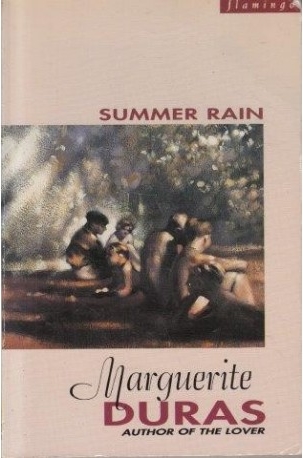Marguerite Duras: Summer Rain

Translated by Barbara Bray
October 2015
This novella centres around an unusual family living in Vitry. The parents, immigrants, are shamelessly unemployed, and their seven children, unschooled, unoccupied, in the main left to their own devices. But this is not a dysfunctional family, rather, in fact, a deeply loving one, and though uneducated, all members, even among the youngest of brothers and sisters, instinctually wise.
I would place this book near the intersection of Gibran and Hesse in terms of style. Presenting almost like a parable – though not with any discernible lesson – its characters are not in any sense realistic. In its unadorned sentences and in the conversations of its characters, it exhibits a mistrust of the ability of words to express its intentions, nevertheless, strives to evoke its meaning through the careful curation of its lines.
I have not been so excited to discover an author in a long time.